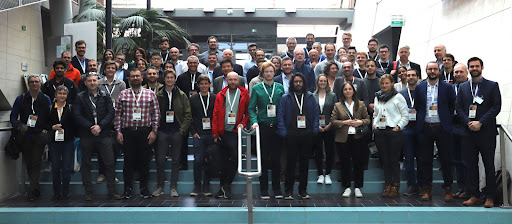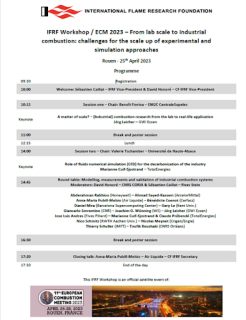-
IFRF Workshop entitled ‘From lab scale to industrial combustion: challenges for the scale up of experimental and simulation approaches’ held at the 11th European Combustion Meeting
Date posted:
-
-
-
Post Author
Greg Kelsall
-
-

You can now find out about the proceedings and download presentations and images here.
The IFRF workshop on the topic of ‘ From lab scale to industrial combustion: challenges for the scale up of experimental and simulation approaches’, was held on the 25th April 2023 in Rouen, France. This was a ‘warm-up’ to the main 11th European Combustion Meeting (ECM), hosted by the French Section of the Combustion Institute, on April 26th-28th 2023.
The workshop focused on the stationary industrial sectors of steel, glass, cement, power production, biomass and wastes as fuel, including 2 keynote presentations, It was well attended with 63 people from 11 countries joining, split 42%/58% across industry and academia.
The two key-note presentations and posters from the event, together with an extensive selection of photographs and images will be made available to attendees to download from the IFRF website in due course. As was the case with IFRF’s 48th TOTeM meeting held last October 2022, a post meeting questionnaire will be sent to the attendees, which will include a link to the event materials.
The workshop was summarised nicely in the closing address given by Anna Pubill Melsió from Air Liquide R&D and a member of the IFRF French Flame Committee. Anna thanked the audience for all of their posters covering a range of subjects including measurements, emissions production and ‘new’ fuels. She described these as being “very interesting and encouraging to see”, but noting also that “there is still a lot to be done”.
Anna also thanked Jörg Leicher of the Gas- und Wärme-Institut and Marianne Cuif-Sjostrand, of TotalEnergies, the keynote speakers of the day, for the quality and clarity of their presentations which gave and excellent base for the rich discussions that followed. She went on to say that “process and size matter and for each their purpose as well. You have seen the different processes from the primary industry where each one has its own characteristics and objectives. For size we have seen three scales: laboratory for well-defined phenomena, semi-industrial for crucial phenomena and industrial for what is found in real-life. To connect them we have simulation and modelling tools used to improve accuracy and reliability but also to push understanding, for quick improvement and easy to use for disruptive technologies as TotalEnergies has shown”.
“Size also triggers to work by phases and to define the right type of measurement or to be more flexible to adapt the measurements and qualifications because as we are in an energy transition phase, we need to speed up. Speed up because the request and regulations are coming faster but we are already working on mild combustion, flexible equipment which allow us larger trials and broader usages with several fuels, LES and RANS updates, big advances on optical measurements which are ready to be used at industrial size. And finally, what I have also seen today is that the experimental and numerical people are already discussing together, thus the uncertainty will decrease and we are taking the right path.”

